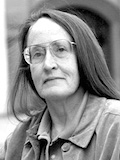GOTO Amsterdam (June 17-19, 2015) is a vendor independent international software development conference with more that 50 top speakers and 500 attendees. The conference covers topics such as AngularJS, Disruption, Docker, Drones, Elasticsearch, Hadoop, Microservices & Scrum.
Mary Shaw, TweetProfessor of Computer Science at Carnegie Mellon University

Biography: Mary Shaw
Mary Shaw is the Alan J. Perlis University Professor of Computer Science in the Institute for Software Research at Carnegie Mellon University, where she has been a member of the faculty since completing her PhD in 1972. For pioneering leadership in the development of innovative curricula in Computer Science, Dr. Shaw received the National Medal of Technology and Innovation from President Barack Obama during a White House ceremony in November 2014. The medal is the nation's highest honor for achievement in the field of technology, innovation, and invention.
Dr. Shaw's research interests are in software engineering and software systems, particularly software architecture and design of sytems used by real people. She is co-author with David Garlan of Software Architecture: Perspectives on an Emerging Discipline and is considered to be one of the founders of the field of software architecture. She has received the U.S. National Medal of Technology and Innovation, the ACM SIGSOFT Outstanding Research Award (with David Garlan), the IEEE Computer Society TCSE's Distinguished Educator Award, CSEE&T's Nancy Mead Award for Excellence in Software Engineering Education, the Stevens Award, and the Warnier Prize. She is a fellow of the ACM, the IEEE, and the AAAS.
Presentation: TweetKEYNOTE: Progress Toward an Engineering Discipline of Software
Is "software engineering" really engineering?
The term was coined in 1968 to call attention to problems with software production. Both theory and practice for software have evolved since then, but do we yet have a true engineering discipline?
Classical engineering disciplines have emerged from craft practice and commercialization through the infusion of codified knowledge and science. Using this emergence pattern as a point of reference, I will sketch the evolution of software engineering, drawing on civil engineering and software architecture for examples that show the progressive codification of informal knowledge toward rigorous models and tools. This will provide the basis for assessing the maturity of the field and identifying our next challenges.
